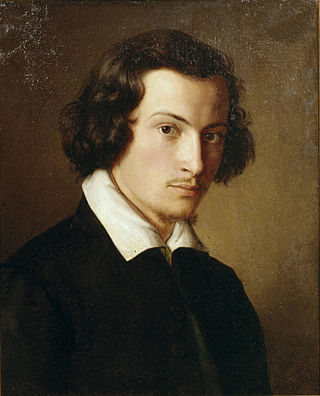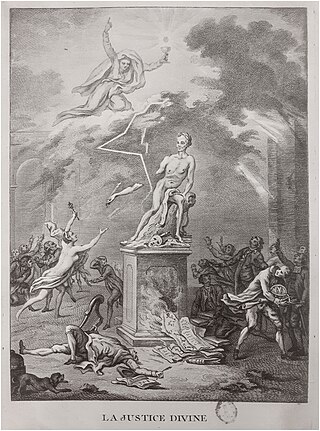
Johann Gottlieb Fichte was a German philosopher who became a founding figure of the philosophical movement known as German idealism, which developed from the theoretical and ethical writings of Immanuel Kant. Recently, philosophers and scholars have begun to appreciate Fichte as an important philosopher in his own right due to his original insights into the nature of self-consciousness or self-awareness. Fichte was also the originator of thesis–antithesis–synthesis, an idea that is often erroneously attributed to Hegel. Like Descartes and Kant before him, Fichte was motivated by the problem of subjectivity and consciousness. Fichte also wrote works of political philosophy; he has a reputation as one of the fathers of German nationalism.

Modern paganism, also known as contemporary paganism and neopaganism, spans a range of new religious movements variously influenced by the beliefs of pre-modern peoples across Europe, North Africa, and the Near East. Despite some common similarities, contemporary pagan movements are diverse, sharing no single set of beliefs, practices, or religious texts. Scholars of religion may study the phenomenon as a movement divided into different religions, while others study neopaganism as a decentralized religion with an array of denominations.

Philipp Veit was a German Romantic painter and one of the main exponents of the Nazarene movement. It is to Veit that the credit of having been the first to revive the nearly forgotten technique of fresco painting is due.

German Romanticism was the dominant intellectual movement of German-speaking countries in the late 18th and early 19th centuries, influencing philosophy, aesthetics, literature, and criticism. Compared to English Romanticism, the German variety developed relatively early, and, in the opening years, coincided with Weimar Classicism (1772–1805).

Friedrich Daniel Ernst Schleiermacher was a German Reformed theologian, philosopher, and biblical scholar known for his attempt to reconcile the criticisms of the Enlightenment with traditional Protestant Christianity. He also became influential in the evolution of higher criticism, and his work forms part of the foundation of the modern field of hermeneutics. Because of his profound effect on subsequent Christian thought, he is often called the "Father of Modern Liberal Theology" and is considered an early leader in liberal Christianity. The neo-orthodoxy movement of the twentieth century, typically seen to be spearheaded by Karl Barth, was in many ways an attempt to challenge his influence. As a philosopher he was a leader of German Romanticism. Schleiermacher is considered the most important Protestant theologian between John Calvin and Karl Barth.

Jena is a city in Germany and the second largest city in Thuringia. Together with the nearby cities of Erfurt and Weimar, it forms the central metropolitan area of Thuringia with approximately 500,000 inhabitants, while the city itself has a population of about 110,000. Jena is a centre of education and research. The University of Jena was founded in 1558 and had 18,000 students in 2017 and the Ernst-Abbe-Hochschule Jena serves another 5,000 students. Furthermore, there are many institutes of the leading German research societies.
Religious nationalism can be understood in a number of ways, such as nationalism as a religion itself, a position articulated by Carlton Hayes in his text Nationalism: A Religion, or as the relationship of nationalism to a particular religious belief, dogma, ideology, or affiliation. This relationship can be broken down into two aspects: the politicisation of religion and the influence of religion on politics.

Karl Wilhelm FriedrichSchlegel was a German poet, literary critic, philosopher, philologist, and Indologist. With his older brother, August Wilhelm Schlegel, he was one of the main figures of Jena Romanticism.

Georg Philipp Friedrich Freiherr von Hardenberg, pen name Novalis, was a German aristocrat and polymath, who was a poet, novelist, philosopher and mystic. He is regarded as an influential figure of Jena Romanticism.

The Völkisch movement was a German ethnic nationalist movement active from the late 19th century through the dissolution of the German Reich in 1945, with remnants in the Federal Republic of Germany afterwards. Erected on the idea of "blood and soil", inspired by the one-body-metaphor, and by the idea of naturally grown communities in unity, it was characterized by organicism, racialism, populism, agrarianism, romantic nationalism and – as a consequence of a growing exclusive and ethnic connotation – by antisemitism from the 1900s onward. Völkisch nationalists generally considered the Jews to be an "alien people" who belonged to a different Volk from the Germans.

The Counter-Enlightenment refers to a loose collection of intellectual stances that arose during the European Enlightenment in opposition to its mainstream attitudes and ideals. The Counter-Enlightenment is generally seen to have continued from the 18th century into the early 19th century, especially with the rise of Romanticism. Its thinkers did not necessarily agree to a set of counter-doctrines but instead each challenged specific elements of Enlightenment thinking, such as the belief in progress, the rationality of all humans, liberal democracy, and the increasing secularisation of European society.

Christian humanism regards classical humanist principles such as universal human dignity, individual freedom, and the importance of happiness as essential and principal or even exclusive components of the teachings of Jesus.
Geist is a German noun with a significant degree of importance in German philosophy. Geist can be roughly translated into three English meanings: ghost, spirit, and mind or intellect. Some English translators resort to using "spirit/mind" or "spirit (mind)" to help convey the meaning of the term.
Gerhard Albert Baum, better known as Gregory Baum, was a German-born Canadian priest and theologian in the Catholic Church. He became known in North America and Europe in the 1960s for his work on ecumenism, interfaith dialogue, and the relationship between the Catholic Church and Jews. In the later 1960s, he went to the New School for Social Theory in New York and became a sociologist, which led to his work on creating a dialogue between classical sociology and Christian theology.

Christian Heinrich Arthur Drews was a German writer, historian, philosopher, and important representative of German monist thought. He was born in Uetersen, Holstein, in present-day Germany.

Dorothea Friederike von Schlegel was a German novelist and translator.

Formal diplomatic relations between the Holy See and the current Federal Republic of Germany date to the 1951 and the end of the Allied occupation. Historically the Vatican has carried out foreign relations through nuncios, beginning with the Apostolic Nuncio to Cologne and the Apostolic Nuncio to Austria. Following the dissolution of the Holy Roman Empire and the Congress of Vienna, an Apostolic Nuncio to Bavaria replaced that of Cologne and that mission remained in Munich through several governments. From 1920 the Bavarian mission existed alongside the Apostolic Nuncio to Germany in Berlin, with which it was merged in 1934.

The atheism dispute was an event in German cultural history that lasted between 1798 and 1800 and had an effect on the German philosophy in the late 18th and the early 19th centuries.
August Ludwig Hülsen, also known by the pseudonym Hegekern, was a German philosopher, writer and pedagogue of early German Romanticism. His thought played a role in the development of German idealism.
The philosophical ideas and thoughts of Edmund Burke, Thomas Carlyle, Johann Gottlieb Fichte, Friedrich Wilhelm Joseph Schelling, Søren Kierkegaard, Arthur Schopenhauer and Richard Wagner have been frequently described as Romantic.














